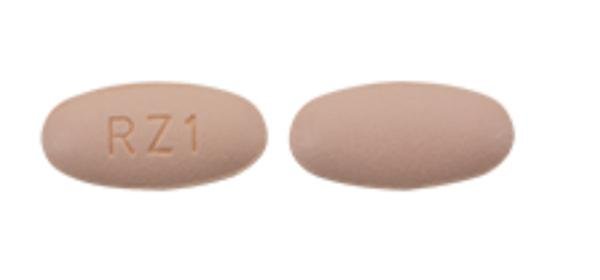Ranolazine
Generic name: ranolazine [ ra-NOE-la-zeen ]
Brand names: Aspruzyo Sprinkle, Ranexa
Dosage forms: oral granule, extended release (1000 mg; 500 mg), oral tablet, extended release (1000 mg; 500 mg)
Drug class: Antianginal agents
What is ranolazine?
Ranolazine is used in adults to treat chronic angina (chest pain). Ranolazine is not for use during an acute (emergency) attack of angina.
Ranolazine may also be used for purposes not listed in this medication guide.
Ranolazine side effects
Get emergency medical help if you have signs of an allergic reaction: hives; difficult breathing; swelling of your face, lips, tongue, or throat.
Ranolazine may cause serious side effects. Call your doctor at once if you have:
-
a light-headed feeling;
-
fast or pounding heartbeats, fluttering in your chest, shortness of breath, and sudden dizziness (like you might pass out); or
-
kidney problems--swelling, urinating less, feeling tired or short of breath.
Common side effects of ranolazine may include:
-
nausea, constipation;
-
headache; or
-
dizziness.
This is not a complete list of side effects and others may occur. Call your doctor for medical advice about side effects. You may report side effects to FDA at 1-800-FDA-1088.
Warnings
You should not take ranolazine if you have cirrhosis of the liver.
Tell your doctor about all your other medicines. Some drugs should not be used with ranolazine.
Related/similar drugs
amlodipine, metoprolol, aspirin, carvedilol, propranolol, atenolol
Before taking this medicine
You should not take ranolazine if you are allergic to it, or if you have:
-
cirrhosis of the liver.
Some drugs should not be used with ranolazine. Your treatment plan may change if you also use:
-
antifungal medicine--itraconazole, ketoconazole;
-
HIV or AIDS medicine--indinavir, lopinavir/ritonavir, nelfinavir, ritonavir, saquinavir;
-
seizure medicine--carbamazepine, phenobarbital, phenytoin; or
-
tuberculosis medicine--rifabutin, rifampin, rifapentine.
Tell your doctor if you have ever had:
-
long QT syndrome (in you or a family member);
-
liver disease; or
-
kidney disease.
Tell your doctor if you are pregnant or breastfeeding.
How should I take ranolazine?
Follow all directions on your prescription label and read all medication guides or instruction sheets. Your doctor may occasionally change your dose. Use the medicine exactly as directed.
You may take ranolazine tablets with or without food.
Open the pack of ranolazine granules and mix the medicine with a tablespoon of soft food such as applesauce or yogurt. Swallow the mixture right away without crushing or chewing.
Ranolazine granules can also be given through a feeding tube. Ask your doctor or pharmacist if you do not understand these instructions.
Swallow the tablet whole and do not crush, chew, or break it.
Chronic angina is often treated with a combination of drugs. Do not change your dose or dosing schedule without your doctor's advice.
Call your doctor if your symptoms do not improve, or if they get worse.
You may need medical tests to check your heart and kidney function.
Store at room temperature away from moisture and heat.
Ranolazine dosing information
Usual Adult Dose for Angina Pectoris:
500 mg orally twice a day; increase to 1000 mg orally twice a day as needed
Maximum dose: 1000 mg orally twice a day
Use: Treatment of chronic angina
What happens if I miss a dose?
Skip the missed dose and use your next dose at the regular time. Do not use two doses at one time.
What happens if I overdose?
Seek emergency medical attention or call the Poison Help line at 1-800-222-1222.
Overdose symptoms include nausea, vomiting, numbness or tingling, low blood pressure, dizziness, irregular heartbeats, trouble speaking, double vision, hallucinations, confusion, uncontrolled shaking, or fainting.
What should I avoid while taking ranolazine?
Avoid driving or hazardous activity until you know how ranolazine will affect you. Your reactions could be impaired.
Avoid drinking alcohol. Drinking alcohol with ranolazine granules can cause side effects.
Grapefruit may interact with ranolazine and lead to unwanted side effects. Avoid the use of grapefruit products.
What other drugs will affect ranolazine?
Tell your doctor about all your current medicines. Many drugs can affect ranolazine, especially:
-
any other medicine to treat heart disease;
-
an antibiotic or antifungal medicine;
-
oral diabetes medicine;
-
medicine to prevent organ transplant rejection;
-
medicine to treat a mental illness; or
-
medicine to treat or prevent nausea and vomiting caused by chemotherapy or radiation.
This list is not complete and many other drugs may affect ranolazine. This includes prescription and over-the-counter medicines, vitamins, and herbal products. Not all possible drug interactions are listed here.
More about ranolazine
- Check interactions
- Compare alternatives
- Pricing & coupons
- Reviews (87)
- Drug images
- Side effects
- Dosage information
- During pregnancy
- Drug class: antianginal agents
- En español
Patient resources
Other brands
Professional resources
Other brands
Related treatment guides
Further information
Remember, keep this and all other medicines out of the reach of children, never share your medicines with others, and use this medication only for the indication prescribed.
Always consult your healthcare provider to ensure the information displayed on this page applies to your personal circumstances.
Copyright 1996-2024 Cerner Multum, Inc. Version: 12.02.

